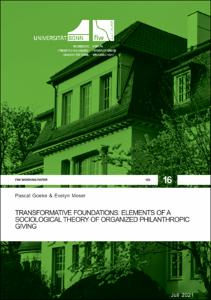Transformative foundations: elements of a sociological theory of organized philanthropic giving

Transformative foundations: elements of a sociological theory of organized philanthropic giving

| dc.contributor.author | Goeke, Pascal | |
| dc.contributor.author | Moser, Evelyn | |
| dc.date.accessioned | 2022-03-31T14:08:52Z | |
| dc.date.available | 2022-03-31T14:08:52Z | |
| dc.date.issued | 07.2021 | |
| dc.identifier.isbn | 978-3-946306-16-0 | |
| dc.identifier.uri | https://hdl.handle.net/20.500.11811/9712 | |
| dc.description.abstract | Within the last two decades, philanthropic foundations have grown in number and wealth. Moreover, an increasing number of them have adopted transformative agendas. These shifts have been investigated in case studies, supported by consulting literature, praised, and criticized. Organization theory alone has remained surprisingly quiet. Therefore, the paper outlines a sociological organization theory of foundations that is particularly attentive to the contradictions and challenges of transformative philanthropy. By reviewing the literature, illustrating current developments, and combining Mauss’ theory of the gift with key concepts from organization theory (mainly resource dependence and legitimacy), foundations will be posited as relatively resource independent organizations that must, for the purpose of goal attainment, organize legitimacy in at least three dimensions: in relation to the initial gift, with regard to their position within democratic societies, and with respect to the societal impact that shall be triggered by means of the gift. | en |
| dc.description.abstract | Gemeinnützige Stiftungen sind in den letzten beiden Dekaden nicht allein zahlreicher und wohlhabender, sondern auch ambitionierter geworden. Statt vorentschiedene Gemeinwohlideen lediglich finanzieren zu wollen, treten sie mit transformativen Agenden auf. Diese Verschiebungen wurden in zahlreichen Fallstudien untersucht, von einer Beratungsliteratur unterstützt und erfuhren sowohl Lob als auch Kritik. Die soziologische Organisationstheorie blieb jedoch auffallend still. Um diese Lücke zu schließen, skizziert der Beitrag eine soziologische Organisationstheorie der Stiftung, die besonders auf die Widersprüche und Herausforderungen einer transformativen Philanthropie achtet. Der Entwurf beginnt mit einer Sichtung und Ordnung der Forschungsliteratur und kombiniert anschließend Mauss’ Gabentheorie mit Schlüsselkonzepten der Organisationstheorie (hauptsächlich Ressourcenabhängigkeitsansatz und Legitimität). Aus dieser Sicht erscheinen Stiftungen als relativ ressourcenunabhängige Organisationen, die sich zum Zwecke der Zielerreichung in wenigstens drei Dimensionen um Legitimität mühen müssen: In Bezug auf die initiale Stiftungsgabe, in Bezug auf ihre Position in Demokratien und bezüglich der angestrebten Wirkungen, die mit den Gabenprogrammen der Stiftung ausgelöst werden sollen. | en |
| dc.format.extent | 36 | |
| dc.language.iso | eng | |
| dc.relation.ispartofseries | FIW Working Paper ; 16 | |
| dc.rights | In Copyright | |
| dc.rights.uri | http://rightsstatements.org/vocab/InC/1.0/ | |
| dc.subject.ddc | 300 Sozialwissenschaften, Soziologie, Anthropologie | |
| dc.title | Transformative foundations: elements of a sociological theory of organized philanthropic giving | |
| dc.type | Arbeitspapier | |
| dc.publisher.name | Forum Internationale Wissenschaft | |
| dc.publisher.location | Bonn | |
| dc.rights.accessRights | openAccess | |
| dc.relation.url | https://www.fiw.uni-bonn.de/de/publikationen/working-paper | |
| ulbbn.pubtype | Zweitveröffentlichung | |
| dc.version | publishedVersion |
Dateien zu dieser Ressource
Das Dokument erscheint in:
-
FIW Working Paper (23)




